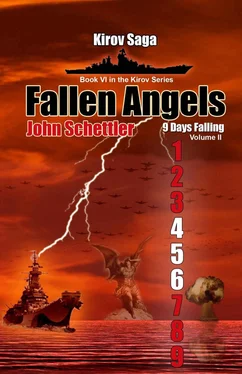“Take a look at the big fat Mi-26 on the roof,” Dobrynin pointed. “There’s more going on here than you realize. They found two more control rods that were produced in the same lot as Rod-25. We have them right here on that helo and the plan is to fly them all the way to the Pacific coast for Kirov and the other ships.”
“But you said Karpov appeared in 1945. It’s October of 1942 now. They’ll have to wait out the entire duration of the war!”
“Exactly,” said Dobrynin. “Don’t give me those big eyes, Mister Fedorov. I didn’t come up with this plan, I was just briefed by the Admiral and told to manage this part of the operation to rescue you and Orlov.”
Fedorov gave a heavy sigh. “Well a lot of good that will do us now. Here I was worrying about the fate of a single man, and now I learn that there’s an entire naval flotilla at large in the Pacific of 1945! Orlov may yet be important, and yes, we must rescue him if possible, but Karpov appears nearly three years later and this will trump everything we do here. I hope to God he keeps a good head on his shoulders and doesn’t start another war! Does he know we’re sending the Mi-26? No…” Fedorov answered his own question. “How could he possibly know? There would be no way to communicate this to him.”
“The plan is to get the Mi-26 to the coast, possibly out on Sakhalin in an isolated location where they can wait for Kirov to appear. Then they’ll try to contact Karpov via radio.”
“If they make it there,” said Fedorov, a frustrated look on his face. “If they manage to survive somewhere until 1945, and if they know exactly when the ships appear, and if Karpov picks up their radio call. Good heavens! What a stack of teacups! A thousand things could happen to them over the next few years. The Japanese controlled all of South Sakhalin Island during the war. Their 88th division was posted there. How many men are you sending on the Mi-26?”
“Just four. All the rest of that space is being used for fuel and supplies to get the helo there. It’s a very long way to the Pacific coast from here.”
“Indeed…” Fedorov shook his head. “We just spent the last week getting here by road and rail.”
Two more control rods had been found! Would they work as Rod-25 had? Dobrynin explained the plan to him, but the longer he listened, the more he began to feel it was doomed to failure. The team would have to remain safely undetected for almost three years. Then, on the day Kirov and the other ships were supposed to appear, they would have to make contact with Karpov as soon as possible. But the Captain would not be expecting their call. In fact…”
“The plan has failed,” he said darkly.
“What do you mean,” Dobrynin complained. “We haven’t even launched the operation yet.”
“You say Karpov managed to get a note to the Naval Logistics Center? That took time. He would have probably sent helicopters with a small Marine contingent to infiltrate Vladivostok and get to the locker just as Troyak and I did. That took time. If your Mi-26 makes it to the Pacific coast and is there and ready to contact the ships upon arrival, then they obviously failed to do so. Karpov would have taken at least a full day to mount this operation and let Volsky know what happened to him—possibly longer. No further message was received? There was nothing stating he received the control rods and was going to use them to try and return home? No, that wouldn’t be possible yet.”
Dobrynin scratched his head. “Not as of 09:40 hours on the day we launched our operation to arrive here.”
“What day was that?”
“October 5th, 2021.”
“What was happening with the war?”
“Things were not going well. The American’s sent planes off one of their carrier groups and Karpov fought an engagement. The Chinese have also attacked Taiwan with a heavy salvo of ballistic missiles and aircraft. There was an incident in the Persian Gulf and now Iran and Israel are at each other’s throats. We even lost a submarine in the Gulf of Mexico. I was informed that Moscow was going to initiate operations here the day I left.”
“Here?”
“At Kashagan and Tengiz oil fields in the North Caspian. There was also a scrap in the Black Sea, but I was too busy here to attend to the reports. I will say one thing. We were under attack at the very time we shifted.”
“Under attack? Here in the Caspian?”
“NATO aircraft were approaching from the south. Just a small pinprick, a couple helicopters, but they were heading right for our operations and the coastal defense missile batteries at Kaspiysk engaged them. That was the last news I received. Now we are here.”
“So Karpov was displaced by that volcanic eruption. Astounding! What day was that?
“October 2nd. It took us another couple of days to pull things together here.”
“Yes, and Rod-25 is very meticulous now. It’s October 5, 1942—the same day you launched the operation in 2021.”
Fedorov sat down, thinking hard now. What could they do? Karpov sent that message, which meant that, during the interval he loitered within helicopter range of Vladivostok, he must have received no communication from the Mi-26. The plan must have failed. If it were to succeed then that long tenuous line from here to the Pacific—from here to 1945—had to remain perfectly intact. Something went wrong. If Karpov was contacted by the helo team then why would he not mention that in his note?
Then it struck him, with thunderclap surprise—Volsky could not dream up the Mi-26 plan until Karpov sends his letter! Of course! Otherwise the Admiral would have no idea where Kirov and the others shifted. So Karpov appears in a kind of limbo, a brief slice of eternity where the future is uncertain. When he first appeared Volsky had no knowledge of his presence in the past, but the instant Karpov’s team delivered that letter and closed the locker at the Naval Logistics building a new time line was possible! That single act of transmitting information to the future has already worked a change in the line of events. Volsky got the letter and here we are on the Anatoly Alexandrov trying to sort this whole mess out.
His mind ran on, feverishly trying to work through the convoluted loops of time and causality. So it isn’t possible for us to successfully contact Karpov the moment he arrives, he thought, because that all depends on his decision to send that letter. We can go there with the Mi-26, but somehow the effect of that operation will have to occur after Karpov arrives in 1945. Even if everything went perfectly with the Mi-26 and they remained safely undetected until Kirov appears, Karpov could not possibly hear or respond to our radio calls until after he sent his letter. How long was that interval, that slice of uncertainty in time? What was Karpov doing during those hours? Now he found himself laboring to recall the history of those last days of the war, history that they had already dramatically altered with their sorties into the past.
“Dobrynin…Did that letter say when Karpov arrived. Did it give an exact date?”
“August of 1945.”
“No day?”
“That is all I was told, Mister Fedorov.”
“Damn! We need to know the exact date.”
“What do you mean? We have three years to wait for Kirov to show up again. What is the problem?”
“The problem is this: we know Karpov arrives in August, but on what day? We can’t order the team to just start broadcasting radio calls on August first round the clock. They’ll be detected for sure. Then there’s Karpov. That’s another potential problem.”
“What do you mean?”
“I’m not sure what he will do if he decides there is no way he can ever get back to 2021. If he thinks his bridges are burned, and there is no other life for them but the one they have there in 1945, then he might do something radical. He’ll have the power to make a dramatic intervention if he chooses to do so. The only problem is that he may overreach himself. The United States Navy was enormous at that stage of the war, and they would all be concentrating at Sagami Bay off Tokyo for the surrender ceremony…”
Читать дальше











